Sell your dental practice while maximising its value, and minimising your tax
No dental practice sale is identical to another. It usually takes at least 6 months for the process of selling a dental practice to be completed, but this varies depending of the type of practice that is involved and the support structure that is in place. The process itself should always involve certain important steps.
If you are wondering what the proper steps are to sell a dental practice, keep these 9 points in mind. If you’re ready, contact us today and our expert dental practice sales agents will help guide you through the process.
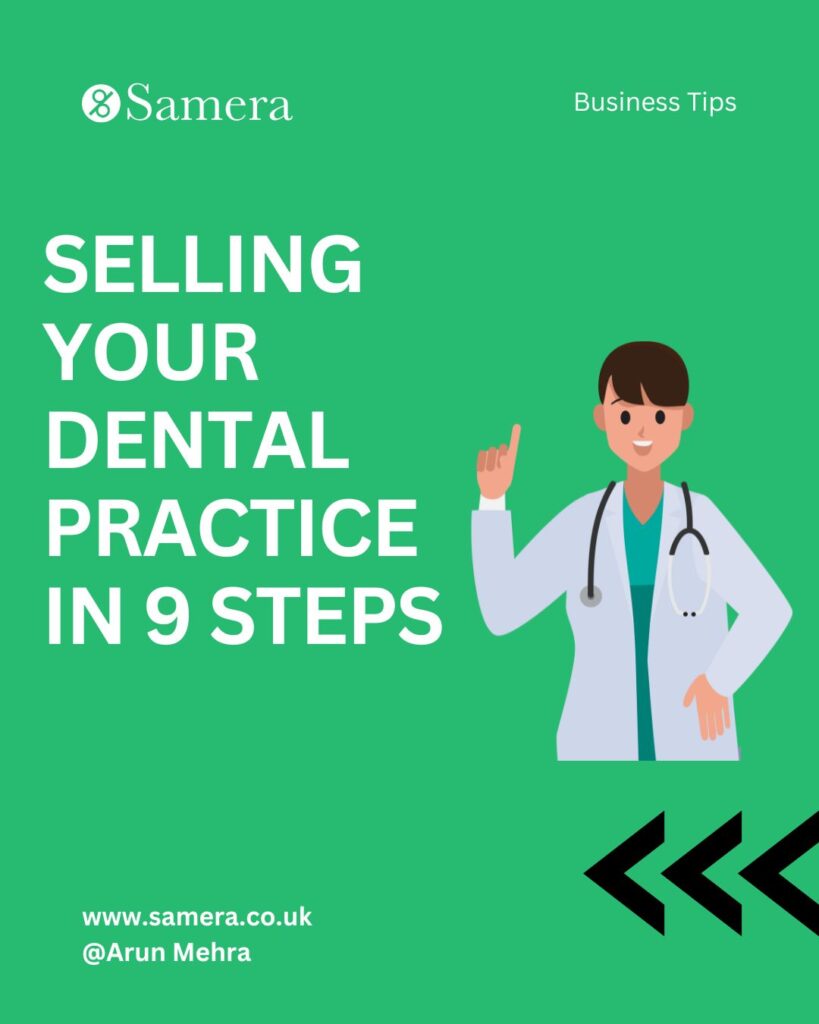
How to Sell a Dental Practice Webinar
In this webinar, Arun explains what you need to know about maximising the value before you sell your practice.
Step One: Work out your timeline to sell your dental practice
When are you looking to sell your dental practice? Is it in the next 12 months, or is it in 3-4 years time? Are you thinking of staying on working at the practice or are you looking to make a clean break when you sell?
We have often found that it takes around 6 months to sell a dental practice. However, all deals are different, they all present their own challenges and they can all take varying lengths of time.
When you plan on selling your dental practice, and how far ahead in the future the sale will be, is crucial to making sure you get the best possible price.
Once you have a clear idea of when you are thinking about selling, work backwards and plan what you think needs doing. Ask yourself these questions:
- What is the financial performance of your dental practice like?
- How profitable is the dental practice?
- Does it show a steady improvement or decline?
- If in decline, what needs to be done to turn the situation around?
- How dependent is the practice of your income generation?
- How dependent is the practice of any key income earners?
- If you fell ill at the practice, would it still be profitable?
- If not, what would need to be done to make it profitable in such a scenario?
If you have no idea what the answers are to these questions, then you have your work cut out, and you really need to get your house in order to ensure you achieve the sale you want in the timeline you want. Otherwise, you will struggle to get a qualified buyer with the right money for your dental practice.
Action Points
- Determine your desired timeline for selling your dental practice, considering whether it’s within the next year or in 3-4 years.
- Decide if you plan to continue working at the practice post-sale or if you prefer a complete departure.
- Understand that selling a dental practice typically takes about 6 months, though timelines can vary due to unique challenges each deal may present.
- Assess the current financial performance and profitability of your dental practice, noting any trends of improvement or decline.
- Identify necessary actions to improve the practice’s financial health, especially if it’s currently in decline.
- Evaluate the practice’s dependency on your personal income generation and its capacity to remain profitable in your absence, such as during illness.
- Develop a plan to address any issues identified in the financial performance and operational dependency to ensure the practice’s profitability and appeal to potential buyers.
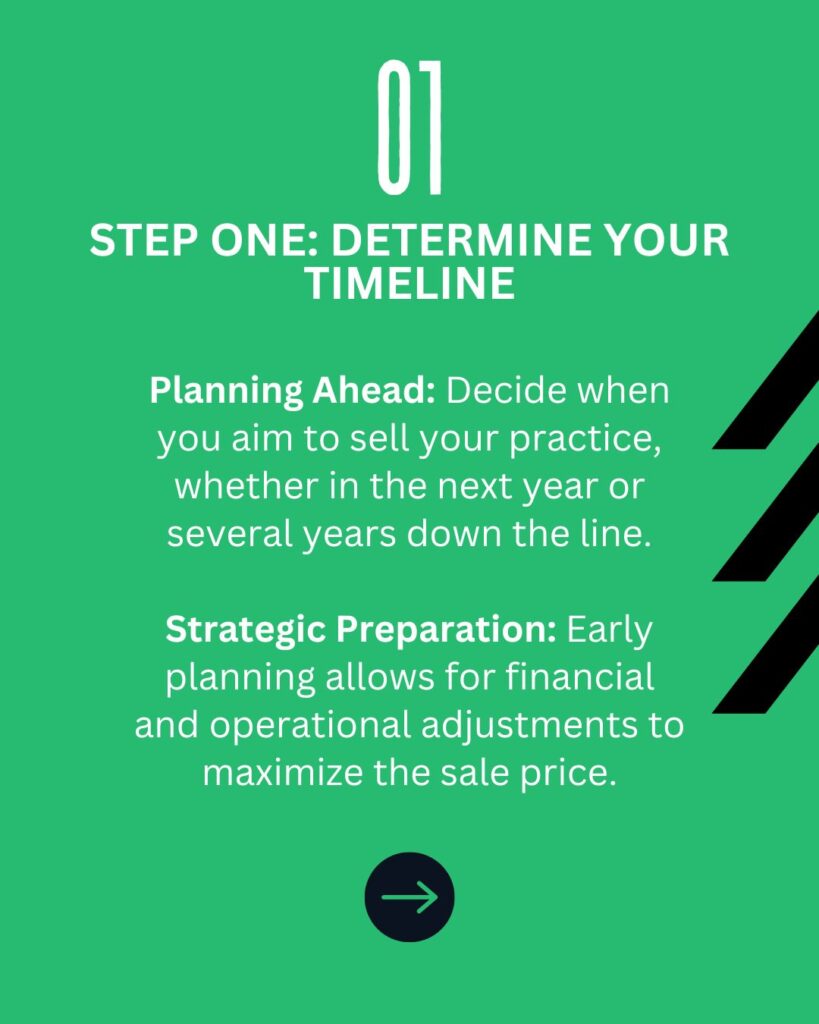
Click here to watch our webinar on selling a dental practice.
Step Two: Raise the profitability to sell a dental practice
The times of using a % of your revenue figure as a metric for valuing a dental practice are truly gone. Whilst revenue may inflate your ego, it will be your profit that will determine your valuation and the price you sell your practice. A valuation of your goodwill will more than likely be based on profitability, whilst using turnover purely as a secondary indicator.
Click here to read more about growing a dental practice.
EBITDA (Earnings before Interest Tax Depreciation and Amortisation) is a term you may have heard about. This is a common measure used to determine the “cash” profit of the business and is increasingly used to value dental practices, especially by the cash-rich Dental Corporates. Focus on increasing your EBITDA to maximise the value of your practice goodwill and other assets.
Click here for more information on EBITDA.
Action Points
- Shift focus from revenue to profitability as the key determinant in valuing your dental practice.
- Understand that goodwill valuation will primarily be based on profitability, with turnover serving as a secondary metric.
- Familiarize yourself with EBITDA (Earnings before Interest, Tax, Depreciation, and Amortization) as a crucial measure of “cash” profit.
- Aim to increase your practice’s EBITDA, as this metric is commonly used by Dental Corporates and others in the industry for valuation purposes.
- Implement strategies to enhance the profitability of your dental practice, thereby maximizing the value of your practice’s goodwill and other assets in preparation for sale.
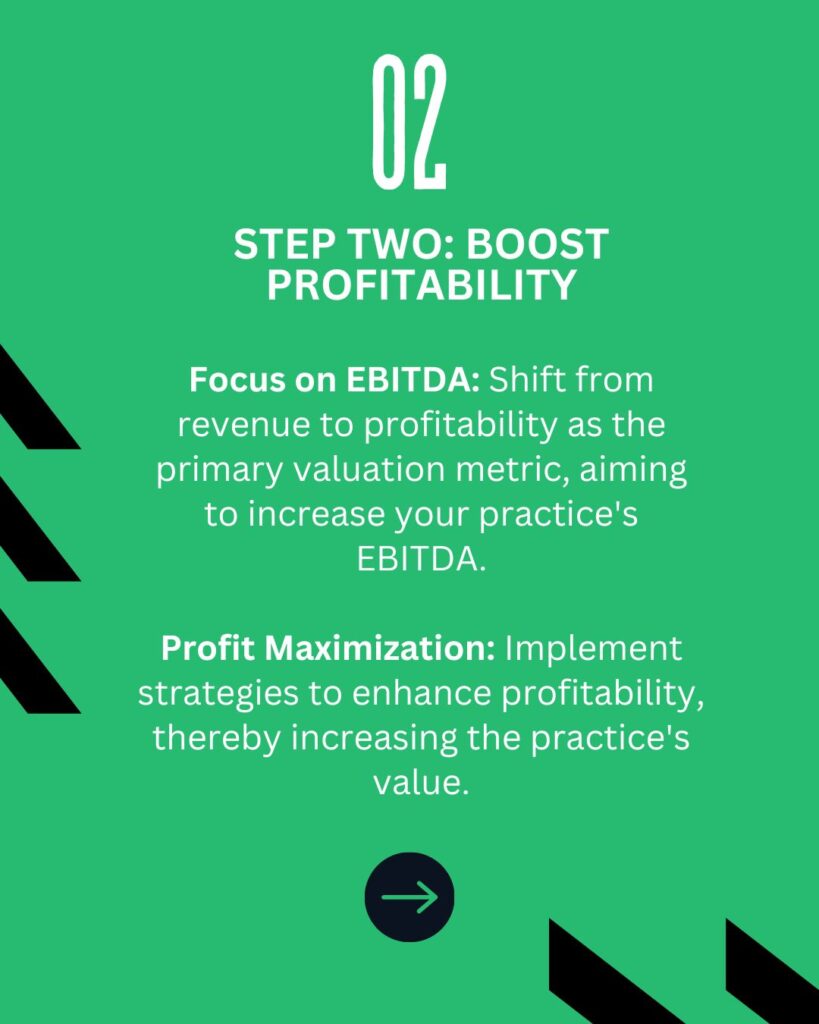
Step Three: Get your financial house in order to sell your dental practice
Whilst high-quality clinical dentistry is essential in order to sell a dental practice, it is critical to have accurate and up-to-date financial information about your dental practice as well. Why? Well, the reasons are two-fold.
- If you are serious about improving your financial performance, you will need to know where things are working, but also where problems lie. Not knowing the figures means you don’t really have your finger on the pulse with respect to your practice performance and, therefore, its valuation. Knowing your financial performance, and adjusting it accordingly, is imperative to maximising the sales value of your dental practice.
- When it comes to showing off your financial performance to prospective buyers, having an up-to-date set of accounts (last 3 years), plus recent management accounts (last 12 months) really are essential. These can be a deal breaker if not available, as a serious buyer is only going to buy your practice if they have accurate financial information about your practice in the first place.
If you have up-to-date financial information, it is then imperative to ensure your cost base is managed well, whilst your revenue is strong – Why? So you are maximising your EBITDA.
Contact us to find out more
For instance, look at your staff costs; have you got too many staff for the revenue you are generating? Are your laboratory bills carefully managed? What about your materials, have you sourced cost-effective suppliers? And do you have a tight control over ordering each month? How much are you spending on marketing? It’s very easy to spend on marketing, but are you getting a good return on it?
Click here to find out more about accounting and managing finance in a dental practice.
Run through each line of your accounts and see where you can make potential savings, then act on making the changes needed. Why? Because every £ saved increases your profit, which increases your EBITDA, which increases your practice valuation.
In summary, if you want to get top whack for your practice, make sure you have up-to-date and accurate financial information for any prospective buyers, but have also ensured your cost base is well managed, and your revenue is maximized.
Action Points
- Ensure your dental practice’s financial information is accurate and current, as this is crucial for both valuation and sale preparation.
- Conduct a thorough financial analysis to identify strengths and areas for improvement within your practice.
- Maintain a clear understanding of your practice’s financial performance to effectively manage and adjust operations for maximum sales value.
- Prepare and organize the last 3 years of financial accounts and the most recent 12 months of management accounts for prospective buyers.
- Recognize the importance of these financial documents in providing transparency and building trust with serious buyers, potentially influencing their decision to purchase your practice.
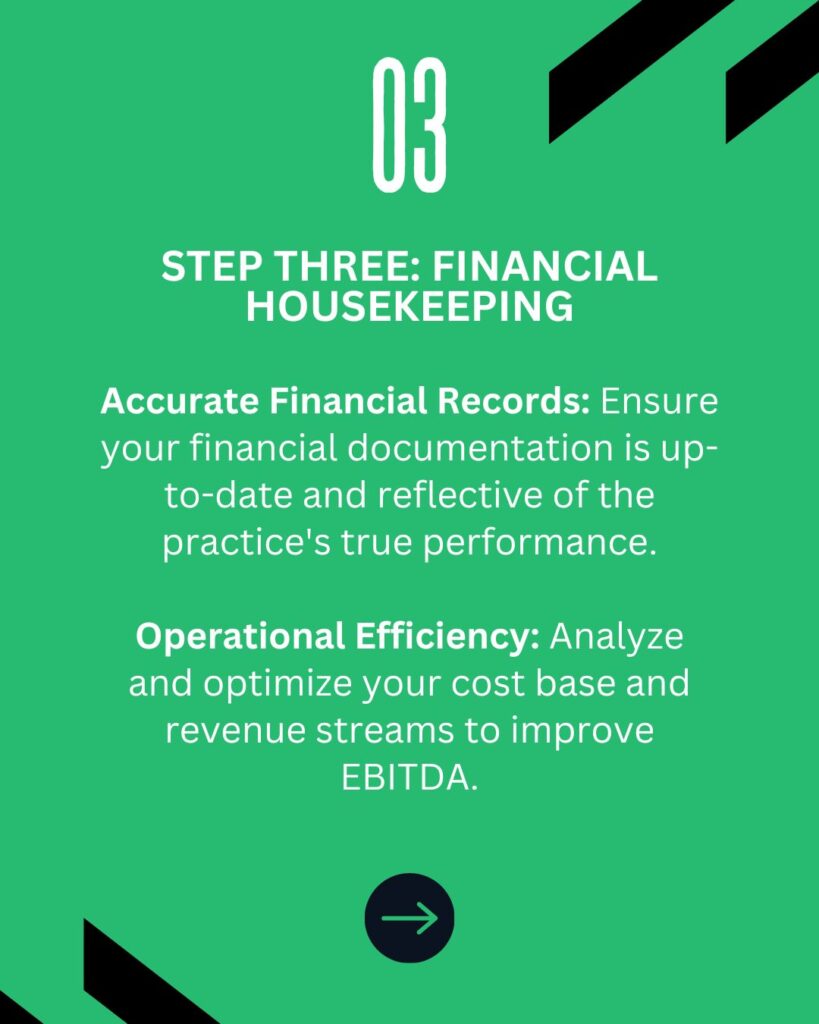
Click here to listen to our podcast on how to structure your dental practice finances.
Step Four: Find or build a team that will help you get maximum value when you sell a dental practice
Running a dental practice is one thing, selling it successfully is something completely different. To maximise the sale of your practice, getting the right advisors early on can significantly add to the ultimate sales price.
Creating a power team makes it far more likely that a sale will be secured at the right price. Accountants, brokers and lawyers with significant dental experience, are essential to getting an excellent deal.
Our experience has shown that it really is essential to have people who know and understand your practice before it is even put on the market for sale.
A few tweaks in the business in the right place can optimise its performance, which will ultimately improve the practice sale value. So, make sure you have thought through your timeline for sale, then work with expert dental accountancy, legal and marketing advisors that can recommend a course of action.
Specialist Dental Sales brokers
Making sure to engage a specialist dental sales broker is important. It provides far more value than trying to sell a practice without professional assistance.
Specialist dental sales brokers have access to a long list of active, interested individuals and corporates that want to buy your practice, who they can introduce to clients. They can also professionally value practices, create sales brochures and deal with questions about, and interest in, a practice. The normal cost of using this service is around 2.5-5% of the sale price.
In other words, a dental practice sales broker can get you a much better price for your business.
Click here to read our 8 things you need to know when choosing a dental practice sales agent.
Specialist Dental Accountants
A specialist dental accountant and tax advisor helps a seller to get the most from the sale of a dental practice. They know how to present accounts in a way that is attractive to buyers. They can also provide advice on aspects such as ownership of the business and how to optimise the tax position of the seller.
Seek advice early from your Specialist Dental Accountant, as before selling a dental practice there maybe tax structures that could be considered before the final sale, which could save tax.
Click here to find out more about our dental accountancy services.
Specialist Dental Solicitors
It’s never a good idea to use the services of a solicitor who has no experience of the dental practice market when selling a dental surgery. They may be an excellent solicitor when it comes to dealing with the sale of a home, but without the required specific experience of the dental industry they could cause serious delays with the sale, or it could collapse altogether.
Do not forget, the solicitor that is chosen will be advising on vital aspects of the sale such as the contract, due diligence and property transfer, so expertise is essential. The normal cost of this service is around £5,000 – £10,000 for a sole trader or partnership and around £10,000-£20,000 for a limited company.
Click here to listen to our podcast on the 7 legal pitfalls of dental practice sales.
Action Points
- Assemble a team of advisors with extensive dental industry experience to aid in selling your practice.
- Partner with accountants, brokers, and lawyers who specialize in dental practices to ensure a favorable sale outcome.
- Implement strategic business adjustments recommended by your advisory team to enhance your practice’s performance and sale value.
- Engage a specialist dental sales broker to access a wider pool of potential buyers and benefit from professional valuation and marketing services.
- Consult with a specialist dental accountant for tax optimization and financial presentation advice tailored to attract buyers.
- Retain a solicitor with dental market expertise to handle legal aspects of the sale efficiently, avoiding potential delays or deal collapse.
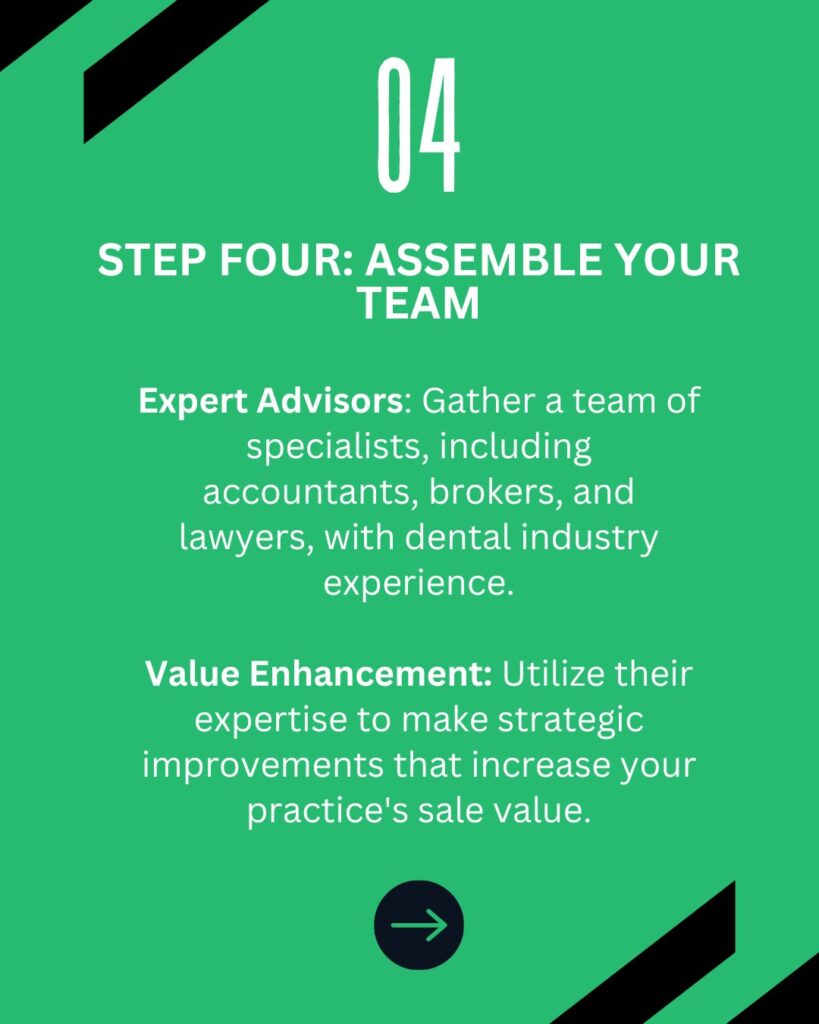
Step Five: Practice visits and information disclosure
From our experience, no-one sells a dental practice better than the owner. They are the best person to answer any buyer questions, honestly and thoroughly. This is why I would always recommend the seller is present when buyers view a practice.
If you are the owner, try and arrange visits when you are around. This will enable you to sift through the serious buyers, but also provide you with the opportunity to sell the key benefits of buying your practice.
Remember, you may end up working at the practice for some time post-sale, it is imperative you understand and (maybe even like) the incoming party!
At this stage, the prospective buyer may well request certain information from you too, such as accounts, management accounts, details of the property lease, CQC registration details, details of the dentists working in the practice etc.
If you have your house in order, as detailed in step 3, you will have no problem in collating and providing this information to them. However, make sure that non-disclosure agreements have been signed, which will protect both parties.
Click here to read more about associated costs that buyers will scrutinise.
Contact us to find out more
Non-disclosure agreements
Non-disclosure agreements are an essential feature of a dental practice sale. They prevent potential buyers from discussing the sale with anyone except their own financial advisors. This is important as you do not want any details of the sale to leak out prior to completion.
It’s not even a good idea to disclose any information to people working in the practice. There is no certainty that a deal will go through until completion actually happens. It’s not worth creating stress and uncertainty amongst the dental practice team when there is no valid reason to do so.
Click here to read more about retirement and transition planning.
Document Other Agreements
Another important point to remember is that you may have verbal agreements with your support staff. When you’ve been running a business for so long, sometimes it can be easy to let certain things become purely verbal or even unspoken agreements.
When you’re selling a dental practice, it’s essential to make sure that all verbal agreements you may have with support staff, contractors or suppliers are documented properly. Make sure your agreements are in the form of a written contract to ensure a smoother transition.
Action Points
- Ensure your presence during practice visits to effectively communicate the value of your dental practice to potential buyers and answer their questions directly.
- Organize viewings for times when you can be present, allowing you to assess buyer compatibility and sincerity while showcasing your practice’s key benefits.
- Be prepared to provide detailed information such as financial records, lease details, and CQC registration to interested buyers, ensuring all documentation is in order.
- Require non-disclosure agreements to be signed by potential buyers to maintain confidentiality and protect sensitive information about the sale.
- Document all verbal agreements with staff and suppliers to formalize arrangements and ensure a seamless transition to new ownership.
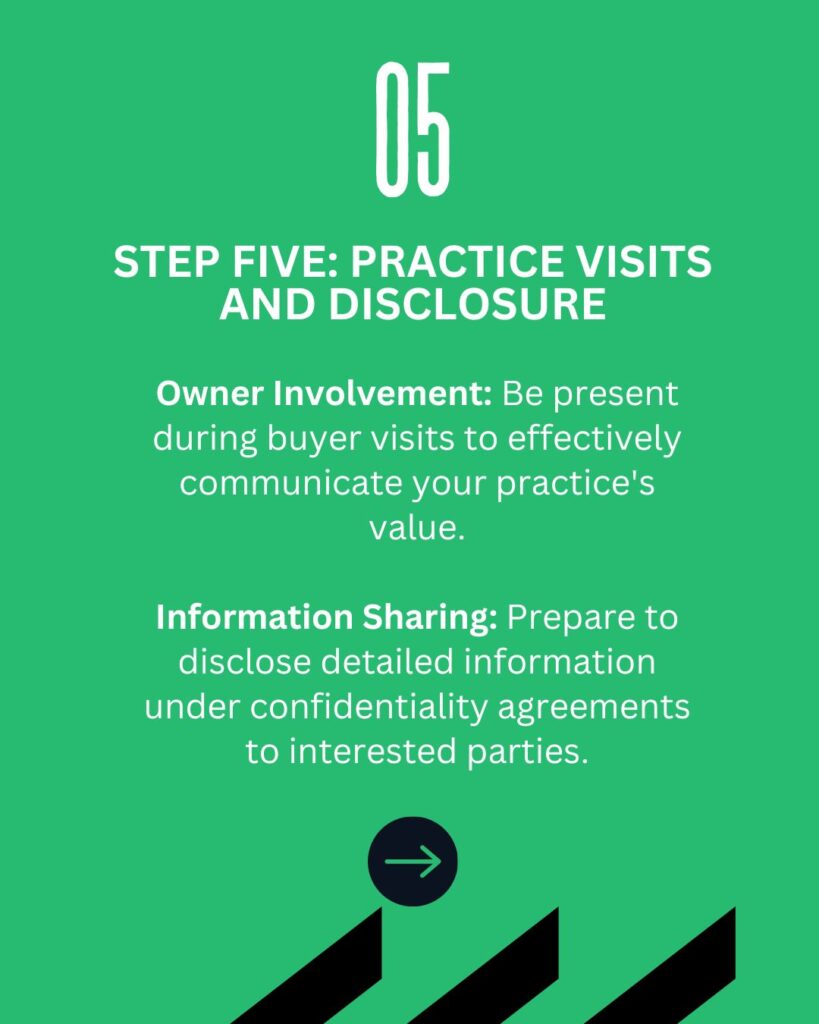
Step Six: Consider ALL offers before you sell your dental practice
When you put your practice out for sale you may well receive various offers. The key is to ensure you review each and every offer in detail.
Whilst an offer from your Associate may be the best one financially, they may struggle to raise the money from the bank, especially in this climate. Whilst a Dental Corporate may well offer you a slightly lower price, they can typically move quickly and get the deal done, whilst your Associate is still filling in forms for the bank!
Always assess each offer you receive carefully, knowing the full facts and the exact conditions of purchase, such as a tie-in to continuing to work at the practice for a few years. In addition, you may be requested for key personnel to stay on if you accept the offer, so the offer made may need to satisfy some of the existing team by getting them to sign and stay for a period too.
Details of the offer and knowing the buyer has the economic power to actually buy the practice are critical at this stage, or else you really will be wasting your time on offers from keen buyers who actually have no substance behind them.
An offer that guarantees a large sale price may seem like the best choice, but it’s not a great deal if the buyer making it is going to struggle to secure funding. There are many things to consider when looking at offers that have been made. Here are a few which are fairly common.
- Can the buyer secure funding easily and quickly?
- Is a lower offer the best choice as a quick sale is guaranteed, so associated costs will be reduced.
- Is staying on as an associate part of the offer?
- Are any of the current team part of the offer, do they need to agree to stay in order for the deal to progress?
- Does the buyer have the substance for the sale to be successful?
It’s never as simple as just picking the highest offer and running with it.
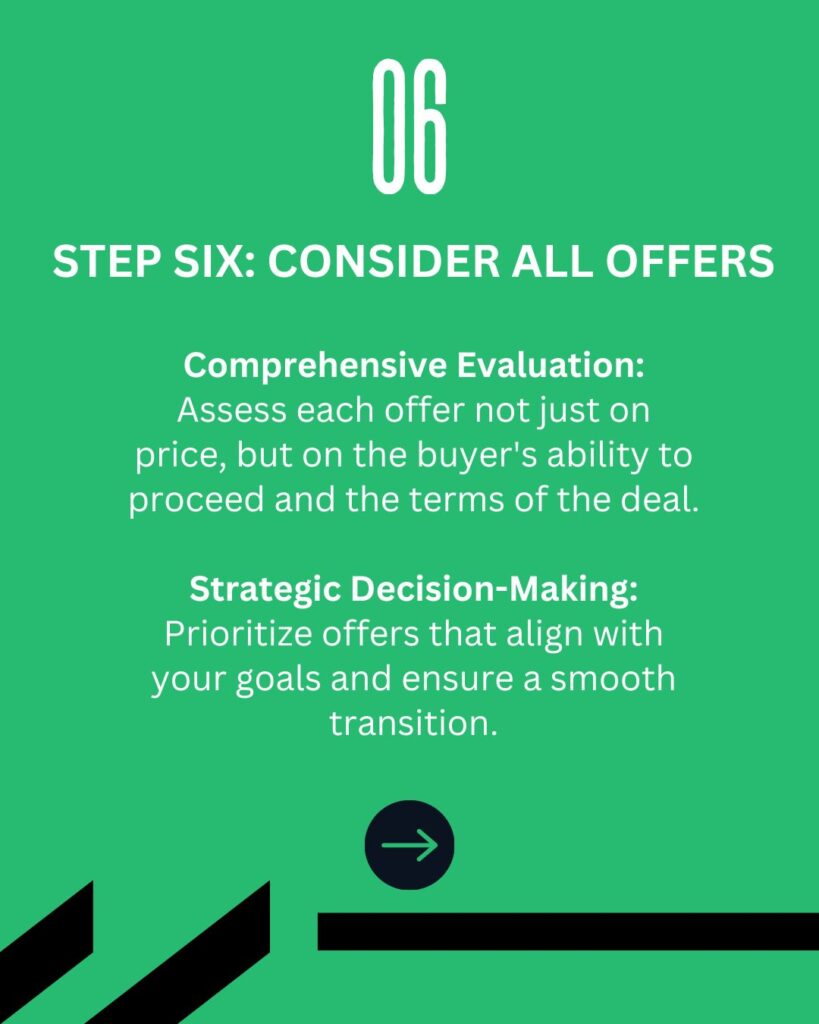
Click here to read our 5 mistakes to avoid when selling to a dental corporation.
Step Seven: Negotiating a deal and due diligence
Once an offer comes along which looks interesting, it’s time for the dental specialist sales broker to structure the right deal for the seller, taking into account what the seller expects from the sale and what their tax situation is. There are several different arrangements for payment that can be put into place.
- Upfront payment transfer for NHS driven profits.
- Deferred payments when performance based criteria comes into play.
- Earn out agreement when a buyer is not willing to meet the sale price now but payment of an additional amount based on profits can be made at a later date. This can mean that the seller achieves more than the original sale price at the end of the day.
- Negotiated UDA rates for a seller who is going to remain working at the practice after the sale.
Once the deal has been negotiated and agreed, Heads of Terms should be put in writing so that there is no room for misunderstanding. These terms will normally be written by the buyer’s solicitor but they should be scrutinised by the seller’s expert dental solicitor. They should always be marked as “subject to contract”.
Do not sign these without taking legal advice.
A timeline for exchange and sale can be agreed at this point, but is subject to due diligence being completed successfully.
Once the heads of term have been signed and agreed, the buyer will now want to carry out due diligence on what they are buying. This will include due diligence in the 3 key areas of legal, clinical and financial.
Depending on the type of buyer, this can be quite a thorough and exhaustive process which requires you, the vendor, to be organised and quick in providing the information by key dates.
INFORMATION THAT WILL BE REQUESTED INCLUDE:
- Historic Accounts and Financial records
- Clinical patient records
- CQC registration details
- Employment contracts
- Associate agreements
- Supplier contracts
- Hire purchase and lease contracts
- Property lease agreement
- Details of the performance of the practice
- Loan agreements
- Complaint details
- Patient list details
This list is not exhaustive. Due diligence can be a complex process and sellers always need to be prepared to provide any requested information and to answer buyer’s questions in a transparent manner.
Click here to read more about due diligence.
Standard Purchase Agreement
Both parties should be protected as part of a Standard Purchase Agreement. The buyer’s solicitor will normally request a warrant from the seller to state that all contractual and financial information provided is accurate. The seller’s solicitor should negotiate to ensure that any inclusions in the warrants minimise the risk of any potential future claims.
A Standard Purchase Agreement will normally include:
- Sale of the practice and assets.
- Handover.
- Post completion considerations.
- Partially completed treatments.
- Employees of the practice.
- Non-Solicitation and restrictive covenants.
- Warrants.
- Guarantees.
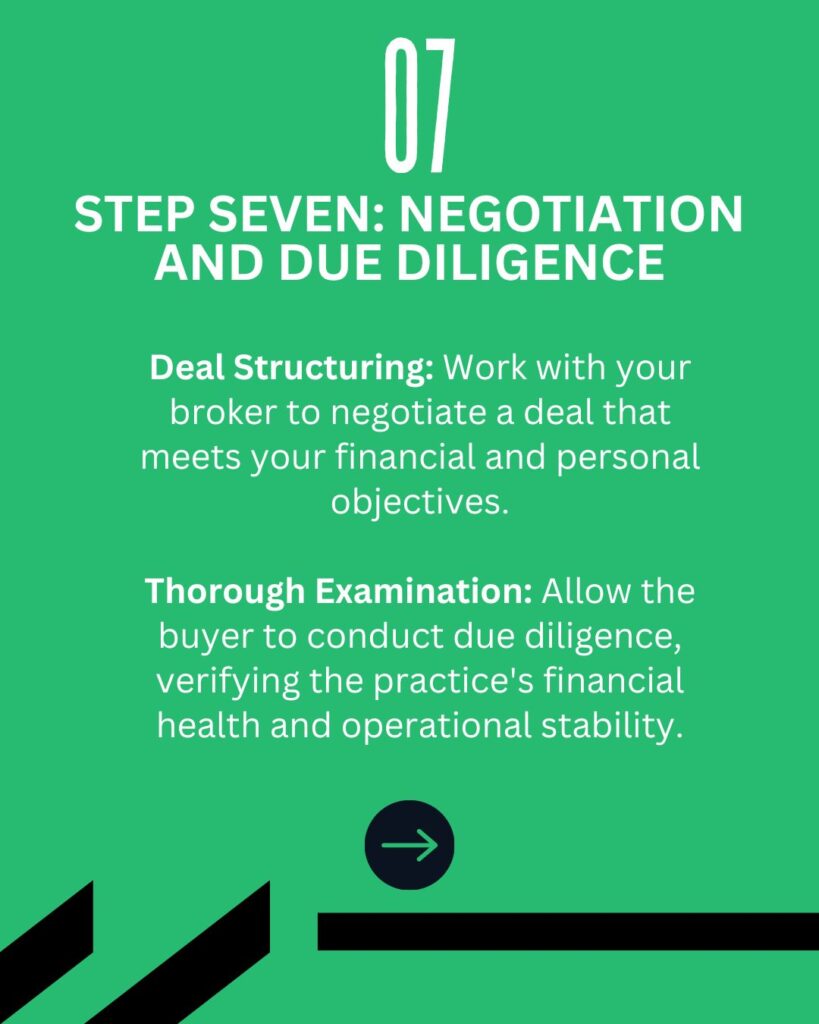
Step Eight: Exchange and completion
Once the due diligence has been completed, and the buyer is satisfied with what they are buying, then it is down to finalising the transaction. If the buyer is using a bank to finance the transaction then they will need to have satisfied all their necessary criteria too.
If all parties are happy, the deal can then be finalised by the solicitors of both parties.
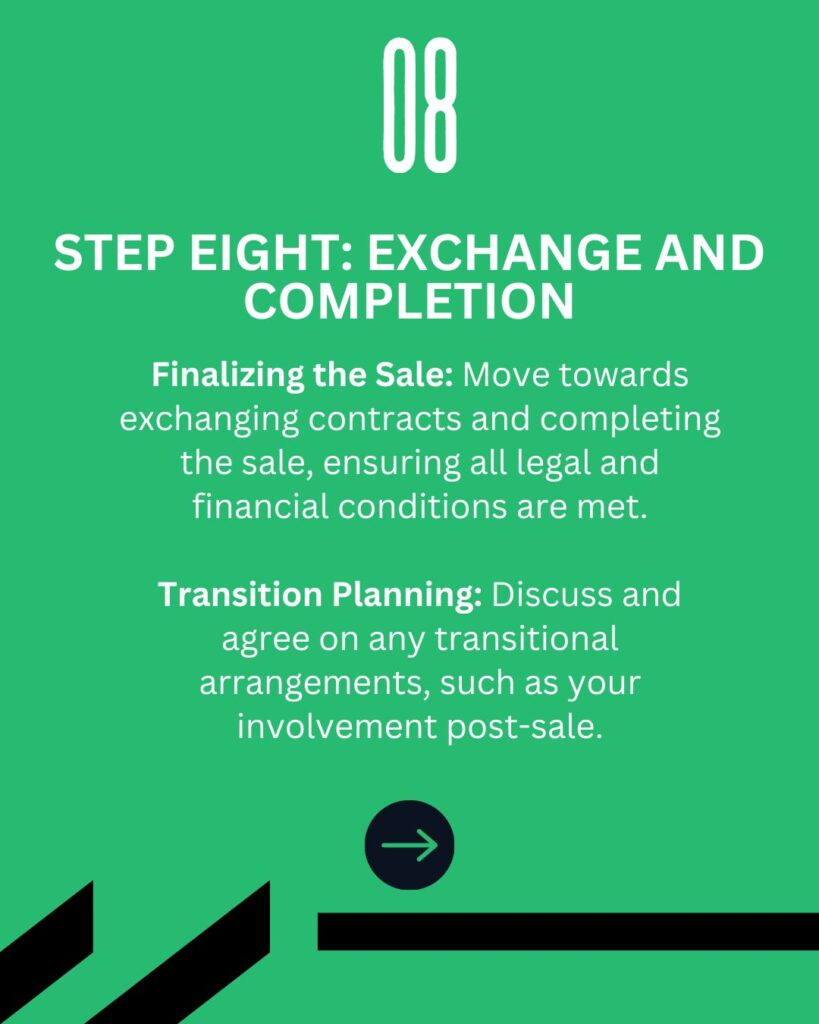
Click here to read the 7 things we wish we’d known before selling our first practice.
Step Nine: Banking the money and paying the tax man!
Your solicitor will more than likely receive the funds due electronically. These will then be wired to your bank account, but don’t spend it all too quickly!
If money is being paid up front, this will normally be transferred into the bank account of the seller’s solicitor on the date of completion.
Enjoy it, but use it wisely and remember it is more than likely you will have a capital gains tax bill to pay.
Under current tax legislation, you may be entitled to Entrepreneurs relief against the Capital Gains Tax payable. If so, this may reduce the effective Capital Gains tax rate to just 10%. There are various criteria that need to be met to ensure you achieve a rate of just 10%, so seek professional advice before you sell.
Action Points
- Anticipate the receipt of funds electronically through your solicitor, who will then transfer them to your bank account.
- Understand that upfront payments are typically transferred to the seller’s solicitor’s bank account on the completion date.
- Exercise financial prudence with the newly acquired funds, keeping in mind the potential capital gains tax obligations.
- Explore the possibility of qualifying for Entrepreneurs’ Relief, which could reduce the Capital Gains Tax rate to 10%, and ensure you meet the necessary criteria.
- Consult with a tax professional or financial advisor to navigate the tax implications effectively and to make the most of any available tax reliefs.

Click here to read the 7 essential things to consider before selling a dental practice.
Contact us to find out more
What is Samera’s Process for Selling a Dental Practice?
We like to simplify the process to 8 major steps when we help dentists sell a dental practice.
- Initial enquiry – The vendor sends the completed data collection form to Samera and initial discussion with our team takes place.
- Valuation and practice visit – This is when we confirm the key variables and arrange a visit at the practice and our report is discussed with the vendor(s). Phase one of Samera marketing process is explained and begins straight after the meeting.
- Viewings – Phase 2 of Samera marketing process consists of appointment making with potential buyers who have already been screened and viewings.
- Offer stage – We negotiate the best financial package and best terms, then Heads of Terms are negotiated and agreed.
- Due diligence – Key information and documents are reviewed by legal teams.
- Ongoing Support – We are there at every step of the way, supporting sellers during the financial and legal due diligence for a smooth completion.
- Completion – Sales and transfer of funds to the vendor’s bank account.
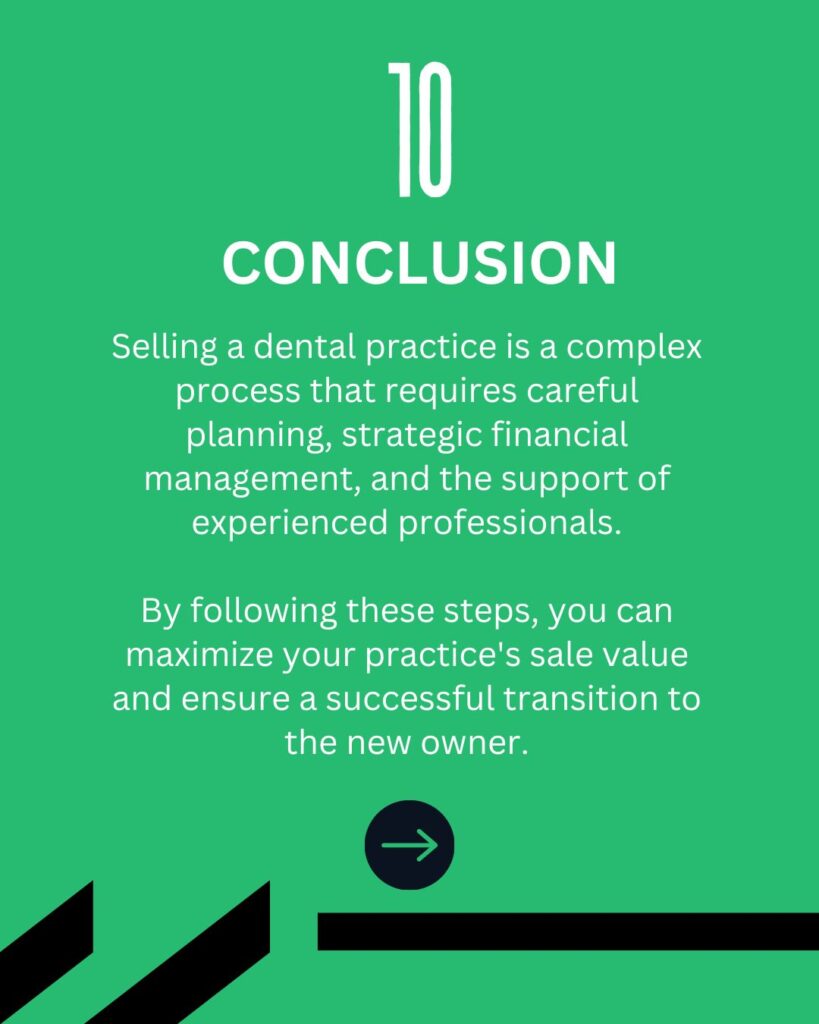
Click here to find out more about selling a dental practice with Samera.
Selling a Dental Practice FAQs
How Do I Value My Dental Practice?
If you want to know how to value a dental practice, you firstly need to know that every single practice is unique, and every single dental practice has a range, where a lower range and a higher range. Of course, this will be determined by the financial accounts, so we always ask for at least the last 3 years’ sets of accounts, and the most up-to-date management accounts.
We analyse the potential value of a practice by visiting the practice and using a comprehensive questionnaire we have tailor made for dental practice valuations. We then create a valuation report and discuss with you the exact market value of your dental practice. If you are selling a practice and want to know what it is worth, please do get in touch.
You can find out more about determining the value of a dental practice here.
How Long Does Selling A Practice Take?
The length of time that it takes for selling a dental practice in the UK varies subject to several factors, such as the type of practice. However, the dental practice sales process averages to 5 and a half months from beginning to end, (from the initial inquiry to the completion of the deal).
How Do I Maximise The Value Of My Practice?
In order to maximize the value of your dental practice, you need to know that every single dental practice has a price range. In order to maximize the price, the first and most important thing to do is to value the practice properly according to market value. Generating a loss of interest, creating a successful and strategic marketing campaign.
At Samera Dental Practice Sales, we have a huge database of active registered buyers. Most importantly, we have a personable and sustainable relationship with our buyers that keep coming back and buying practices from us. We had a very successful year last year. We sold all valued in excess of £100 million worth of practices, with most of the practices achieving above asking price. If you are selling a dental practice and want to know how to maximize its value, please do get in touch.
What Do I Need To Sell My Practice?
If you are selling a dental practice, there are a few documents and contracts that you should have prepared for any potential buyers to look at. For example, any buyers would want to have visibility of their last 2 years’ sets of accounts, as well as the latest 12 months of management accounts. Also, if you have a verbal agreement with any of your support staff, do make sure that these agreements are documented and written down in a contract, so that any potential buyer will continue to pay and remunerate your staff as you currently do.
Most importantly, if you are thinking of selling a dental practice, perhaps you should think that if you were a buyer, what would you want to know about your practice? This is always a good question to ask yourself, alongside the reason for selling your practice. If you want to know more about what documents and what contracts should be prepared ahead of selling a dental practice, please do get in touch.
Why Do Some Buyers Choose To Pay Over A Deferred Period?
A deferred payment on the completion of a dental practice sale is when part of the agreed price is paid over billable time, over a number of years. That is always subject to either target for personal target achieved in terms of income, or practice turnover. We see more and more deferred payments applied to some of the deals completed over the years.
This is usually done by some corporates, and often some individual buyers, where they think that there might be an element of risk associated with the full price. They might want to protect themselves by applying for the deferred payment. If you want to know if your practice qualifies for deferred payment, or it might be subject to a deferred payment negotiation, and how to negotiate a deferred payment, please do get in touch.
Should I Get A Practice Evaluated When Selling To An Associate?
If you’re thinking about selling a dental practice, and even if you’re thinking about selling to your associate, you should always have a valuation carried out of your practice. Imagine if you’re selling a practice to your associate, and perhaps you decide to stay and work together for a number of years. Perhaps you sell below market value, and you realize a year or two year later you are above market value; clearly, it’s going to create some animosity with you and your associate.
However, even if you don’t decide to stay, it’s always advisable to achieve the best available price, and the best deal structure. If you want to know what your practice is worth and if you want any support in how to negotiate with your product associate, please do get in touch.
Why Should I Use A Broker For Selling My Practice?
A broker will help you to achieve the best price and the best possible deal structure available on the market by engaging with as many buyers as possible to create a loss of interest and examine the practice you’re thinking of selling.
Click here to find out more about finding a dental practice sales agent.
Why Should I Use Samera As My Broker?
We have a huge database of active registered buyers, corporate buyers or an individual buyer looking to purchase a practice. Most importantly, we have a personable and sustainable relationship with all of our buyers. We always match the right buyer with the right practice for the best price and for the best deal structure available in the market. We work on success. Your success is our success.
Click here to book a consultation to find out more about how we can help.
What Is EBITDA?
EBITDA is (E)arnings (B)efore (I)nterest, (T)axes, (D)epreciation and (A)mortisation it is an industry-standard way of determining a business’s profit and overall financial performance.
It is one of the key metrics we use to valuate dental practices.
What Should I Consider When Buying A Corporate Practice?
I think you should consider buying an ex-corporate practice. With corporates, they always have a good marketing strategy and they are usually very CQC compliant. They’re great with their policies and procedures. They really know how to run a day-to-day dental practice. The cons that you should consider are why are they selling their practice in the first place? Consider it just might not fit in their strategy or there might be other reasons, and that’s something we could help you with to see whether this purchase would be suitable for your needs.
What Do I Do With My Equipment Still Leased?
If all or part of your equipment is leased you could either transfer the arrangements to the buyer, if they are in agreement or paying it off, which is usually most buyers preferred choice.
What Are The Legal Warranties?
Most solicitors acting on behalf of their clients as buyers will advise their client to include in the Standard Purchase Agreement ( SPA ) document, a warrant from you as a seller that all information provided including any financial and contractual aspect of the practice is true and accurate.
On the other hand, the seller’s solicitors should negotiate and deal with the warranties in a way that protects the vendor and minimise their risks against potential claims in the future.
Will The Dental Sales Process Trigger A New CQC Inspection?
The Care Quality Commission is another potential reason for a delay in practice sale, even sometimes 3 months delays if either the buyer or the seller don’t have their DBS check ready and available to submit, or the practice has not been inspected lately.
The process of selling a practice will involve deregistration of the seller and registration of the buyer to work at the practice, and this process will likely trigger a new CQC inspection unless one was carried out recently. So have everything ready and DBS not older than 6 months when planning to sell a practice.
Do I Need To Have All My Certificates Ready And Available?
During the due diligence process, you will be asked to provide and show your certificates such as the GDC registration for you and your qualified staff, professional indemnity insurance, employer’s liability cover, autoclaves, compressors and X-Rays.
Have all those ready and it will save you time when selling a practice.
What If I Have A Lease On The Property?
If there is a lease on the property and the lease is less than 15 years to the expiry date, it is advisable to talk to your landlord about a potential extension and engage the landlord at an early stage.
Any buyer would want at least 15 years lease or more if possible and the likelihood is that the landlord would ask for his legal costs to be covered.
What If I Own The Property?
The options are either selling the property, or have a lease in place with the buyer. If you are selling to a Corporate, you should know that the property aspect of the deal is not their main interest. However, they may acquire your property if you wish to sell it. The property will be valued as a commercial property and not on a residential basis, so this is a point to consider when thinking about selling or not.
What Issues Do You Come Across When Selling A Practice?
We have never encountered an issue that we cannot resolve.
No practice is the same but we have never encountered an issue that we cannot resolve, sometimes it just takes a little longer. Any problems usually come to light at the due diligence stage when all documents are thoroughly inspected.
You can find out more about issues in the selling process here.
What Is The Sales Process Of A Dental Practice?
We like to simplify the process to 8 major steps.
Initial enquiry – The vendor sends the completed data collection form to Samera and initial discussion with our team takes place.
Valuation and practice visit – This is when we confirm the key variables and arrange a visit at the practice and our report is discussed with the vendor(s). Phase one of Samera marketing process is explained and begins straight after the meeting.
Viewings – Phase 2 of Samera marketing process consists of appointments making with potential buyers already been screened and viewings.
Offer stage – We negotiate the best financial package and best terms, then Heads of Terms are negotiated and agreed.
Due diligence – Key information and documents are reviewed by legal teams.
Ongoing Support – We are there at every step of the way, supporting sellers during the financial and legal due diligence for a smooth completion.
Completion – Sales and transfer of funds to the vendor’s bank account.
When Should I Inform My Staff Of The Sale?
Selling a dental practice is a very emotional and challenging time in any dental owner’s life.
Informing your staff is a crucial step in the dental practice sales process and this must be done at the appropriate time.
If the timing is wrong, it could create unnecessary stress and uncertainty amongst your loyal and faithful staff, and what if the sales are not completed? The risk is ending up with creating disruption, loss of trust, loss of revenue and more costs.
Your solicitor will be able to advise you when the right time to inform your staff of the sale is.
What If I Have An NHS Contract?
If your contract is time-limited (PDS) instead of open-ended (GDS), it may be worth considering a conversion, as a GDS contract (if possible) may attract more buyers. There are risks when converting the contracts, so it is always advisable to seek legal and financial expert support.
Regarding the sale of the dental practice with the NHS contracts, there will be 28 days’ notice between exchange and completion to add to the NHS element of the deal.
Do I Need To Prepare An Inventory?
Yes most certainly so, it takes some time and is boring but it will create clarity with regards to the items you are leaving at the practice and the items you are taking with you, also it will avoid any potential arguments and dispute further down the dental sales process.
What Do I Do After Selling My Practice?
Consider accurately life after selling your dental practice, and make plans ahead of marketing the practice.
Whether you are retiring and want to cash in, or want to continue working in the practice or wish to set up a new practice, consider your options prior marketing your practice, and talk to a professional advisor who has helped others make the best choice before.
Do I Need A Specialist Dental Lawyer?
Never consider the services of a solicitor or a firm with no experience with dental practice sales.
It’s that simple, but occasionally we have experienced some dental principals going down the route of a solicitor who may be brilliant dealing with selling houses but could slow down the process of selling a practice.
Using an expert dental solicitor will ensure you get the right advice at the right time within budget.
What Is Due Diligence?
Due diligence is a very important exercise carried out during any dental sales and acquisitions process.
It is divided into legal and financial due diligence. It is an exercise to confirm that all information provided at the time of discussing and agreeing on offers is accurate and precise. Information such as accounts, management accounts, patient numbers, staff contracts, NHS contracts and any legal issues such as change of control clauses, lease and property contracts, just to name a few of the documents are usually checked at this stage. An expert legal and financial team will know what to look for in a professional and time-effective way.
Our Expert Opinion
“I have learnt that to sell your practice for the best terms available is it should always be ready for sale. Instead of thinking you can pick up the phone and ask someone to sell it, you should have everything prepared in advance to stand a chance of getting the best terms available. This means all contracts in place, all accounts up to date, and of course ensuring it is firing on all cylinders, this way you will always get the best available terms out there, as you will then have a wider pool of buyers.”

About the Author

Arun Mehra
With almost twenty years of commercial experience and knowledge in Dentistry, Arun’s expertise is valued by hundreds of businesses across the UK. His financial acumen and know-how, along with his hands-on commercial expertise have helped clients, large and small, new and established to achieve great things.
Arun is the founder of the Samera Group, starting the business with just one client sitting at his father’s dining table. Fifteen years on, Team Samera now service hundreds of Dental clients, run exciting events, help clients raise finance, and are very active in helping clients buy or sell Dental practices.
Sell your Dental Practice with Samera
If you’re thinking about selling your dental practice then Samera can help make sure that you find the right buyer and the best price for your business. If you want to get the best price possible when you sell your dental practice, you need to build the value and grow the revenue to ensure you get the best return on your investment.
Book your free consultation to find out how you can grow the value of your practice before you sell.
More on Selling a Dental Practice
For more information please check out the articles and webinars in the selling a dental practice section of our Learning Centre, like our guide on How to Sell a Dental Practice in 9 Steps.
Make sure you never miss any of our articles, webinars, videos or events by following us on Facebook, LinkedIn, YouTube and Instagram.



